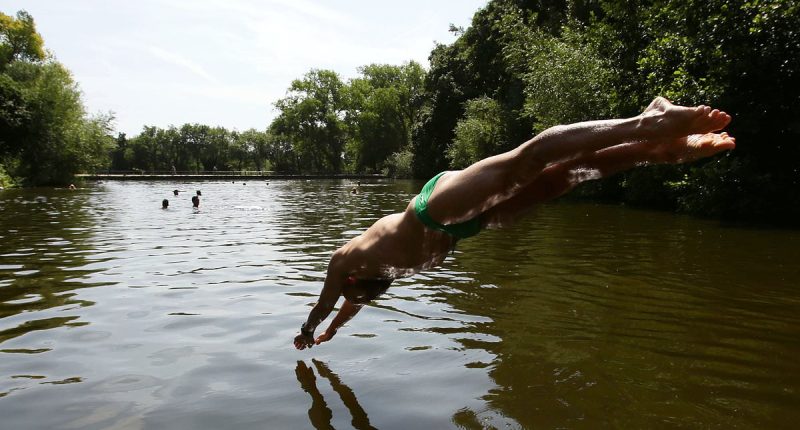Share this @internewscast.com
It’s the trendy health kick making a splash in the UK.
But some of the UK’s most popular wild swimming spots have seen a shocking 1000 per cent rise in potentially life-threatening bacteria, concerning data has revealed.
The Serpentine Lido in Hyde Park, London recorded a 1,188 per cent rise in levels of the diarrhoea-causing bug E.coli in just a year.
The pathogen, which typically also causes a fever, can be spread through contaminated water—with faeces a major source of such contamination.
The same open water swimming spot also saw a 1,085 per cent increase in intestinal enterococci in the same year—another types of bacteria found in human faeces.
Experts, who warned the pathogens pose ‘one of the biggest threats to human health’, urged the authorities to test for such viruses more vigorously.
The Bathing Mobility Advisory Service (BMAS), who analysed the Environment Agency figures, said there was still much work to do to tackle pollution.
The agency tests for harmful bacteria during the official swimming season—May and September.

The Serpentine Lido in Hyde Park, London (pictured) recorded a 1,188 per cent rise in levels of the diarrhoea-causing bug E.coli in just a year

The pathogen, which typically also causes a fever, can be spread through contaminated water—with faeces a major source of such contamination
These tests monitor for sources of pollution known to be a risk to bathers’ health, specifically E. coli and intestinal enterococci, before each bathing site is given a ranking of excellent, good, sufficient or poor.
According to the BMAS analysis, the Serpentine Lido—rated sufficient by the Environment Agency—logged an E.coli count of 580 in 2024, up on the 45 in 2023.
North London’s Hampstead Heath mixed pond, meanwhile, recorded an E.coli count of 310 in 2024, a 230 per cent increase on the 100 in 2023.
The men’s pond followed with a rise of 24.65 per cent over the same time period.
By contrast, the ladies pond saw a drop of 34 per cent, from 350 to 230.
In the majority of E.coli cases symptoms fade naturally within days.
However, for vulnerable populations, the infection can get into the blood and travel to the organs, causing catastrophic damage.
A handful of Brits die from complications of an E.coli infection every year.
Large amounts of rain water can cause an increase in the presence of bacteria such as E. Coli because of the UK’s water laws.
But it can be spread by touching infected animals or their faeces directly, as well as coming into direct contact with infected people’s waste.
BMAS analysis also found intestinal enterococci levels at The Serpentine Lido rose 1,085 per cent between 2023 and 2024, up 27 to 320.
Hampstead Heath ladies pond, meanwhile, recorded a 25 per cent rise over the same time period from 8 to 230.
The men’s and mixed ponds, however, logged drops of 33 and 75 per cent respectively.
Professor Davey Jones, a soil and environmental scientist at Bangor University, urged health authorities to implement more rigorous monitoring of pathogens in water including viruses, which are currently not routinely tested for.
‘They’re one of the biggest threats to human health,’ he said.
‘Some pathogens, like E.coli 0157, can enter groundwater through agricultural runoff and pose serious health risks, even in small amounts.

North London’s Hampstead Heath mixed pond (pictured), meanwhile, recorded an E.coli count of 310 in 2024, a 230 per cent increase on the 100 in 2023

Large amounts of rain water can cause an increase in the presence of bacteria such as E. Coli because of the UK’s water laws
‘As recreational water use increases, especially in urban settings like London, it’s vital we broaden our testing frameworks to include viral contaminants.’
Amelia Hornsby from the BMAS, added: ‘Water quality is a key indicator of environmental health and public safety.
‘Consistently high standards are essential not only for protecting ecosystems, but also for ensuring safe and enjoyable access to our natural waters for local communities and visitors alike.’
It comes as fresh figures released last November found dozens of locations along coasts, lakes and rivers in England failed to meet the minimum water quality standard for 2024, meaning they contained disturbingly high levels of faecal matter.
It marked a two-fold rise on the number rated ‘poor’ in just a year and is the highest figure recorded since the current rating system was introduced in 2015.
Open water swimming has surged in popularity in recent years.
Proponents of the sport claim it helps boost the immune system, speeds up weight loss, improves your mental health and even increases your sex drive.
Research has suggested managed cold water exposure can trigger the release of fat-busting hormones, which can help to protect against obesity and heart disease.
In 2022, a review of 104 studies looked at the effects of cold water blood circulation, the immune system, inflammation and oxidative stress.
Taking a dip in water with temperatures below 20C (68F) was found to activate brown adipose tissue, a type of body fat which burns calories to maintain body temperature.
It also increased production of adiponectin, a protein which plays a key role in protecting against insulin resistance, diabetes and other diseases.
As well as this, some experts have also said the shock of cold that comes from outdoor swimming can boost levels of dopamine and the release of endorphins — feel-good hormones — in the brain.
Some GPs in England actively prescribe cold water swimming on this basis.
But no studies have shown that cold water immersion alone boosts mental health.











